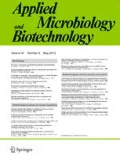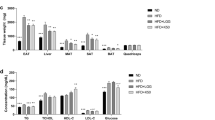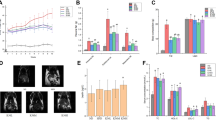Abstract
Previous studies showed that probiotics supplementation contributed to alleviate obesity. This work was to assess the efficacy of Lactobacillus plantarum FRT10 from sour dough in alleviating obesity in mice fed with a high-fat diet (HFD), and the underlying mechanisms focusing on modulation of the gut microbiota profile. Kunming mice were fed with a regular diet (CT), a high-fat diet (HFD), and two HFDs containing low and high doses of L. plantarum FRT10 for 8 weeks. The physiological and biochemical modulations in liver were analyzed. Cecal contents were analyzed by high-throughput 16S ribosomal RNA sequencing. FRT10 supplementation significantly reduced body weight gain, fat weight, and liver triacylglycerols (TGs) and alanine aminotransferase (ALT) concentrations (P < 0.05). FRT10 significantly ameliorated the HFD-induced gut dysbiosis, as evidenced by increased abundance of microbes, including Butyricicoccus, Butyricimonas, Intestinimonas, Odoribacter, and Alistipes, and decreased abundance of Desulfovibrionaceae, Roseburia, and Lachnoclostridium. Lactobacillus, Bifidobacterium, and Akkermansia were markedly increased after FRT10 intervention. In addition, real-time quantitative PCR revealed that FRT10 upregulated the mRNA expression levels of peroxisome proliferator–activated receptor-α (PPARα) and carnitine palmitoyltransferase-1α (CPT1α), and downregulated the mRNA expression levels of sterol regulatory element–binding protein 1 (SREBP-1) and TG-synthesizing enzyme diacylglycerol acyltransferase 1 (DGAT1) in liver. These findings suggested that FRT10 had anti-obesity effects in obese mice partly related to the activation of PPARα/CPT1α pathway. FRT10 can be considered a single probiotic agent for preventing HFD-induced obesity in humans and animals.







Similar content being viewed by others
References
Bron PA, Molenaar D, de Vos WM, Kleerebezem M (2006) DNA micro-array-based identification of bile-responsive genes in Lactobacillus plantarum. J Appl Microbiol 100(4):728–738. https://doi.org/10.1111/j.1365-2672.2006.02891.x
Canfora EE, Jocken JW, Blaak EE (2015) Short-chain fatty acids in control of body weight and insulin sensitivity. Nat Rev Enocrino 11(10):577–591. https://doi.org/10.1038/nrendo.2015.128
Cani PD, Delzenne NM (2009) Interplay between obesity and associated metabolic disorders: new insights into the gut microbiota. Curr Opin Pharmacol 9(6):737–743. https://doi.org/10.1016/j.coph.2009.06.016
Caporaso JG, Kuczynski J, Stombaugh J, Bittinger K, Bushman FD, Costello EK, Fierer N, Peña AG, Goodrich JK, Gordon JI, Huttley GA, Kelley ST, Knights D, Koenig JE, Ley RE, Lozupone CA, McDonald D, Muegge BD, Pirrung M, Reeder J, Sevinsky JR, Turnbaugh PJ, Walters WA, Widmann J, Yatsunenko T, Zaneveld J, Knight R (2010) QIIME allows analysis of high-throughput community sequencing data. Nat Methods 7(5):335–336. https://doi.org/10.1038/nmeth.f.303
Chen M, Hui S, Lang H, Zhou M, Zhang Y, Kang C, Zeng X, Zhang Q, Yi L, Mi M (2019) SIRT3 deficiency promotes high-fat diet-induced non-alcoholic fatty liver disease in correlation with impaired intestinal permeability through gut microbial dysbiosis. Mol Nutr Food Res 63:e1800612. https://doi.org/10.1002/mnfr.201800612
Chen YT, Lin YC, Lin JS, Yang NS, Chen MJ (2018) Sugary kefir strain Lactobacillus mali APS1 ameliorated hepatic steatosis by regulation of SIRT-1/Nrf-2 and gut microbiota in rats. Mol Nutr Food Res 62(8):e1700903. https://doi.org/10.1002/mnfr.201700903
Edgar RC (2013) UPARSE: highly accurate OTU sequences from microbial amplicon reads. Nat Methods 10(10):996–998. https://doi.org/10.1038/nmeth.2604
Everard A, Belzer C, Geurts L, Ouwerkerk JP, Druart C, Bindels LB, Guiot Y, Derrien M, Muccioli GG, Delzenne NM, de Vos WM, Cani PD (2013) Cross-talk between Akkermansia muciniphila and intestinal epithelium controls diet-induced obesity. Proc Natl Acad Sci U S A 110(22):9066–9071. https://doi.org/10.1073/pnas.1219451110
Fabbrini E, Sullivan S, Klein S (2010) Obesity and nonalcoholic fatty liver disease: biochemical, metabolic, and clinical implications. Hepatology 51(2):679–689. https://doi.org/10.1002/hep.23280
Goto T, Lee JY, Teraminami A, Kim YI, Hirai S, Uemura T, Inoue H, Takahashi N, Kawada T (2011) Activation of peroxisome proliferator-activated receptor-alpha stimulates both differentiation and fatty acid oxidation in adipocytes. J Lipid Res 52(5):873–884. https://doi.org/10.1194/jlr.M011320
Hamad EM, Sato M, Uzu K, Yoshida T, Higashi S, Kawakami H, Kadooka Y, Matsuyama H, Abd El-Gawad IA, Imaizumi K (2009) Milk fermented by Lactobacillus gasseri SBT2055 influences adipocyte size via inhibition of dietary fat absorption in Zucker rats. Br J Nutr 101(5):716–724. https://doi.org/10.1017/S0007114508043808
Henkel E, Stoltz M (1982) A newly drafted colour test for the determination of triglycerides convenient for manual and mechanized analysis (glycerolphosphate-oxidase — PAP method). Fresenius J Anal Chem 311(4):451–452. https://doi.org/10.1007/BF00481817
Heo J, Seo M, Park H, Lee WK, Guan LL, Yoon J, Caetano-Anolles K, Ahn H, Kim SY, Kang YM, Cho S, Kim H (2016) Gut microbiota modulated by probiotics and Garcinia cambogia extract correlate with weight gain and adipocyte sizes in high fat-fed mice. Sci Rep 6:33566. https://doi.org/10.1038/srep33566
Jeun J, Kim S, Cho SY, Jun HJ, Park HJ, Seo JG, Chung MJ, Lee SJ (2010) Hypocholesterolemic effects of Lactobacillus plantarum KCTC3928 by increased bile acid excretion in C57BL/6 mice. Nutrition 26(3):321–330. https://doi.org/10.1016/j.nut.2009.04.011
Jump DB, Botolin D, Wang Y, Xu J, Christian B, Demeure O (2005) Fatty acid regulation of hepatic gene transcription. J Nutr 135(11):2503–2506. https://doi.org/10.1093/jn/135.11.2503
Kim DH, Jeong D, Kang IB, Kim H, Song KY, Seo KH (2017) Dual function of Lactobacillus kefiri DH5 in preventing high-fat-diet-induced obesity: direct reduction of cholesterol and upregulation of PPAR-α in adipose tissue. Mol Nutr Food Res 61(11):1700252. https://doi.org/10.1002/mnfr.201700252
Kim J, Lee H, An J, Song Y, Lee CK, Kim K, Kong H (2019) Alterations in gut microbiota by statin therapy and possible intermediate effects on hyperglycemia and hyperlipidemia. Front Microbiol 10:1947. https://doi.org/10.3389/fmicb.2019.01947
Kohjima M, Higuchi N, Kato M, Kotoh K, Yoshimoto T, Fujino T, Yada M, Yada R, Harada N, Enjoji M, Takayanagi R, Nakamuta M (2008) SREBP-1c, regulated by the insulin and AMPK signaling pathways, plays a role in nonalcoholic fatty liver disease. Int J Mol Med 21(4):507–511. https://doi.org/10.3892/ijmm.21.4.507
Kong C, Gao R, Yan X, Huang L, Qin H (2018) Probiotics improve gut microbiota dysbiosis in obese mice fed a high-fat or high-sucrose diet. Nutrition 60:175–184. https://doi.org/10.1016/j.nut.2018.10.002
Lee J, Jang JY, Kwon MS, Lim SK, Kim N, Lee J, Park HK, Yun M, Shin MY, Jo HE, Oh YJ, Ryu BH, Ko MY, Joo W, Choi HJ (2018) Mixture of two Lactobacillus plantarum strains modulates the gut microbiota structure and regulatory T cell response in diet-induced obese mice. Mol Nutr Food Res 62(24):e1800329. https://doi.org/10.1002/mnfr.201800329
Leiva-Gea I, Sánchez-Alcoholado L, Martín-Tejedor B, Castellano-Castillo D, Moreno-Indias I, Urda-Cardona A, Tinahones FJ, Fernández-García JC, Queipo-Ortuño MI (2018) Gut microbiota differs in composition and functionality between children with ty-pe 1 diabetes and MODY2 and healthy control subjects: a case-control study. Diabetes Care 41(11):2385–2395. https://doi.org/10.2337/dc18-0253
Leung C, Rivera L, Furness JB, Angus PW (2016) The role of the gut microbiota in NAFLD. Nat Rev Gastroenterol Hepatol 13(7):412–425. https://doi.org/10.1038/nrgastro.2016.85
Ley RE, Bäckhed F, Turnbaugh P, Lozupone CA, Knight RD, Gordon JI (2005) Obesity alters gut microbial ecology. Proc of the Natl Acad Sci U S A 102(31):11070–11075. https://doi.org/10.1073/pnas.0504978102
Li C, Li L, Lian J, Watts R, Nelson R, Goodwin B, Lehner R (2015) Roles of acyl-coA:diacylglycerol acyltransferases 1 and 2 in triacylglycerol synthesis and secretion in primary hepatocytes. Arterioscler Thromb Vasc Biol 35(5):1080–1091. https://doi.org/10.1161/ATVBAHA.114.304584
Li C, Nie SP, Zhu KX, Ding Q, Li C, Xiong T, Xie MY (2014) Lactobacillus plantarum NCU116 improves liver function, oxidative stress and lipid metabolism in rats with high fat diet induced non-alcoholic fatty liver disease. Food Funct 5(12):3216–3223. https://doi.org/10.1039/c4fo00549j
Li SQ, Li RF, Xi SM, Hu S, Jia ZQ, Li SP, Wen XL, Song YK, Li S, Li SP, Wei FB, Chen XL (2012) Systematical analysis of impacts of heat stress on the proliferation, apoptosis and metabolism of mouse hepatocyte. J Physiol Sci 62(1):29–43. https://doi.org/10.1007/s12576-011-0183-6
Liu W, Zhao S, Wang J, Shi J, Sun Y, Wang W, Ning G, Hong J, Liu R (2017) Grape seed proanthocyanidin extract ameliorates inflammation and adiposity by modulating gut microbiota in high-fat diet mice. Mol Nutr Food Res 61(9):1601082. https://doi.org/10.1002/mnfr.201601082
Lott JA, Turner K (1975) Evaluation of Trinder’s glucose oxidase method for measuring glucose in serum and urine. Clin Chem 21(12):1754–1760. https://doi.org/10.1093/clinchem/21.12.1754
Lv LX, Hu XJ, Qian GR, Zhang H, Lu HF, Zheng BW, Jiang L, Li LJ (2014) Administration of Lactobacillus salivarius LI01 or Pediococcus pentosaceus LI05 improves acute liver injury induced by D-galactosamine in rats. Appl Microbiol Biotechnol 98(12):5619–5632. https://doi.org/10.1007/s00253-014-5638-2
Martínez-Sena T, Soluyanova P, Guzmán C, Valdivielso JM, Castell JV, Jover R (2020) The vitamin D receptor regulates glycerolipid and phospholipid metabolism in human hepatocytes. Biomolecules 10(3):493. https://doi.org/10.3390/biom10030493
Martinic A, Barouei J, Bendiks Z, Mishchuk D, Heeney DD, Martin R, Marco ML, Slupsky CM (2018) Supplementation of Lactobacillus plantarum improves markers of metabolic dysfunction induced by a high fat diet. J Proteome Res 17(8):2790–2802. https://doi.org/10.1021/acs.jproteome.8b00282
Meng Q, Sun S, Luo Z, Shi B, Shan A, Cheng B (2019) Maternal dietary resveratrol alleviates weaning-associated diarrhea and intestinal inflammation in pig offspring by changing intestinal gene expression and microbiota. Food Funct 10(9):5626–5643. https://doi.org/10.1039/c9fo00637k
Miida T, Nishimura K, Hirayama S, Miyamoto Y, Nakamura M, Masuda D, Yamashita S, Ushiyama M, Komori T, Fujita N, Yokoyama S, Teramoto T (2017) Homogeneous assays for LDL-C and HDL-C are reliable in both the postprandial and fasting state. J Atheroscler Thromb 24(6):583–599. https://doi.org/10.5551/jat.40006
Nakamura F, Ishida Y, Aihara K, Sawada D, Ashida N, Sugawara T, Aoki Y, Takehara I, Takano K, Fujiwara S (2016a) Effect of fragmented Lactobacillus amylovorus CP1563 on lipid metabolism in overweight and mildly obese individuals: a randomized controlled trial. Microb Ecol Health Dis 27:30312. https://doi.org/10.3402/mehd.v27.30312
Nakamura F, Ishida Y, Sawada D, Ashida N, Sugawara T, Sakai M, Goto T, Kawada T, Fujiwara S (2016b) Fragmented lactic acid bacterial cells activate peroxisome proliferator-activated receptors and ameliorate dyslipidemia in obese mice. J Agric Food Chem 64(12):2549–2559. https://doi.org/10.1021/acs.jafc.5b05827
Okubo H, Sakoda H, Kushiyama A, Fujishiro M, Nakatsu Y, Fukushima T, Matsunaga Y, Kamata H, Asahara T, Yoshida Y, Chonan O, Iwashita M, Nishimura F, Asano T (2013) Lactobacillus casei strain Shirota protects against nonalcoholic steatohepatitis development in a rodent model. Am J Physiol Gastrointest Liver Physiol 305(12):G911–G918. https://doi.org/10.1152/ajpgi.00225.2013
Park S, Ji Y, Jung HY, Park H, Kang J, Choi SH, Shin H, Hyun CK, Kim KT, Holzapfel WH (2017) Lactobacillus plantarum HAC01 regulates gut microbiota and adipose tissue accumulation in a diet-induced obesity murine model. Appl Microbiol Biotechnol 101(4):1605–1614. https://doi.org/10.1007/s00253-016-7953-2
Pryde SE, Duncan SH, Hold GL, Stewart CS, Flint HJ (2002) The microbiology of butyrate formation in the human colon. FEMS Microbiol Lett 217(2):133–139. https://doi.org/10.1111/j.1574-6968.2002.tb11467.x
Rakhshandehroo M, Knoch B, Müller M, Kersten S (2010) Peroxisome proliferator-activated receptor alpha target genes. PPAR Res 2010:393–416. https://doi.org/10.1155/2010/612089
Russell DW (2003) The enzymes, regulation, and genetics of bile acid synthesis. Annu Rev Biochem 72:137–174. https://doi.org/10.1146/annurev.biochem.72.121801.161712
Sarma SM, Khare P, Jagtap S, Singh DP, Baboota RK, Podili K, Boparai RK, Kaur J, Bhutani KK, Bishnoi M, Kondepudi KK (2017) Kodo millet whole grain and bran supplementation prevents high-fat diet induced derangements in a lipid profile, inflammatory status and gut bacteria in mice. Food Funct 8(3):1174–1183. https://doi.org/10.1039/c6fo01467d
Schwiertz A, Taras D, Schäfer K, Beijer S, Bos NA, Donus C, Hardt PD (2009) Microbiota and SCFA in lean and overweight healthy subjects. Obesity 18(1):190–195. https://doi.org/10.1038/oby.2009.167
Seddik HA, Bendali F, Gancel F, Fliss I, Spano G, Drider D (2017) Lactobacillus plantarum and its probiotic and food potentialities. Probiotics Antimicro 9(2):111–122. https://doi.org/10.1007/s12602-017-9264-z
Tang W, Yao X, Xia F, Yang M, Chen Z, Zhou B, Liu Q (2018) Modulation of the gut microbiota in rats by Hugan Qingzhi tablets during the treatment of high-fat-diet-induced nonalcoholic fatty liver disease. Oxidative Med Cell Longev 2018:1–14. https://doi.org/10.1155/2018/7261619
Wakil SJ, Abu-Elheiga LA (2009) Fatty acid metabolism: target for metabolic syndrome. J Lipid Re 50(Suppl):S138–S143. https://doi.org/10.1194/jlr.R800079-JLR200
Wan Y, Wang F, Yuan J, Li J, Jiang D, Zhang J, Li H, Wang R, Tang J, Huang T, Zheng J, Sinclair AJ, Mann J, Li D (2019) Effects of dietary fat on gut microbiota and faecal metabolites, and their relationship with cardiometabolic risk factors: a 6-month randomised controlled-feeding trial. Gut 68(8):1417–1429. https://doi.org/10.1136/gutjnl-2018-317609
Wang LX, Liu K, Gao DW, Hao JK (2013) Protective effects of two Lactobacillus plantarum strains in hyperlipidemic mice. World J Gastroenterol 19(20):3150–3156. https://doi.org/10.3748/wjg.v19.i20.3150
Wu CC, Weng WL, Lai WL, Tsai HP, Liu WH, Lee MH, Tsai YC (2015) Effect of Lactobacillus plantarum strain K21 on high-fat diet-fed obese mice. Evid Based Complement Alternat Med 2015:391767–391769. https://doi.org/10.1155/2015/391767
Wu L, Liu YY, Li ZX, Zhao Q, Wang X, Yu Y, Wang YY, Wang YQ, Luo F (2014a) Anti-tumor effects of penfluridol through dysregulation of cholesterol homeostasis. Asian Pac J Cancer Prev 15(1):489–494. https://doi.org/10.7314/APJCP.2014.15.1.489
Wu Y, Zhang Z, Tao L, Chen G, Liu F, Wang T, Xue F, Chen Y, He L, Zheng J, Liu Y (2014b) A highly copy number of FCGR3B is associated with psoriasis vulgaris in Han Chinese. Dermatology 229(2):70–75. https://doi.org/10.1159/000360160
Yang JY, Lee YS, Kim Y, Lee SH, Ryu S, Fukuda S, Hase K, Yang CS, Lim HS, Kim MS, Kim HM, Ahn SH, Kwon BE, Ko HJ, Kweon MN (2017) Gut commensal Bacteroides acidifaciens prevents obesity and improves insulin sensitivity in mice. Mucosal Immunol 10(1):104–116. https://doi.org/10.1038/mi.2016.42
Yin X, Peng J, Zhao L, Yu Y, Zhang X, Liu P, Feng Q, Hu Y, Pang X (2013) Structural changes of gut microbiota in a rat non-alcoholic fatty liver disease model treated with a Chinese herbal formula. Syst Appl Microbiol 36(3):188–196. https://doi.org/10.1016/j.syapm.2012.12.009
Yoo SR, Kim YJ, Park DY, Jung UJ, Jeon SM, Ahn YT, Huh CS, McGregor R, Choi MS (2013) Probiotics L. plantarum and L. curvatus in combination alter hepatic lipid metabolism and suppress diet-induced obesity. Obesity 21(12):2571–2578. https://doi.org/10.1002/oby.20428
Zhao Z, Wang C, Zhang L, Zhao Y, Duan C, Zhang X, Gao L, Li S (2019) Lactobacillus plantarum NA136 improves the non-alcoholic fatty liver disease by modulating the AMPK/Nrf2 pathway. Appl Microbiol Biotechnol 103(14):5843–5850. https://doi.org/10.1007/s00253-019-09703-4
Zhu Z, Zhu B, Sun Y, Ai C, Wang L, Wen C (2018) Sulfated polysaccharide from sea cucumber and its depolymerized derivative prevent obesity in association with modification of gut microbiota in high-fat diet-fed mice. Mol Nutr Food Res 62(23):e1800446. https://doi.org/10.1002/mnfr.201800446
Acknowledgments
C.H.Y. wrote the manuscript. Y.P.L., C.H.Y., and W.Z.G. conceived and designed the study. C.H.Y. conducted major experiments. Y.P.L. and W.Z.G. helped to analyze the data and perfect the animal-related experiments design. L.X.M. was involved in providing technical support. M.K. contributed to critically revising the manuscript. All authors approved the final version of the manuscript.
Funding
This research was funded by the National Key Research and Development Program of China (grant no. 2017YFD0400303), the National Natural Science Foundation of China (grant no. 31802081), and the Agricultural Science and Technology Innovation Program of China (grant no. ASTIP-FRI07).
Author information
Authors and Affiliations
Corresponding author
Ethics declarations
Conflict of interest
The authors declare that they have no conflict of interest
Ethical approval
Animal experiments were performed according to the Animal Care and Use Committee of the Feed Research Institute of Chinese Academy of Agricultural Sciences (CAAS) and protocols were approved by the Laboratory Animal Ethical Committee and its Inspection of the Feed Research Institute of CAAS (AEC-CAAS-20090609).
Additional information
Publisher’s note
Springer Nature remains neutral with regard to jurisdictional claims in published maps and institutional affiliations.
Rights and permissions
About this article
Cite this article
Cai, H., Wen, Z., Li, X. et al. Lactobacillus plantarum FRT10 alleviated high-fat diet–induced obesity in mice through regulating the PPARα signal pathway and gut microbiota. Appl Microbiol Biotechnol 104, 5959–5972 (2020). https://doi.org/10.1007/s00253-020-10620-0
Received:
Revised:
Accepted:
Published:
Issue Date:
DOI: https://doi.org/10.1007/s00253-020-10620-0




